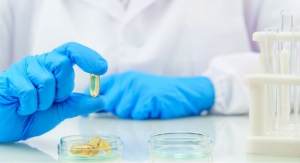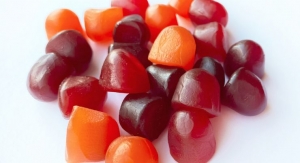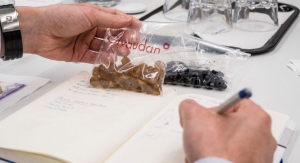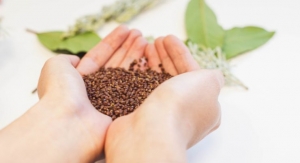04.30.24
Ahiflower, an ingredient rich in ALA and SDA omega-3s sourced from Buglossoides arvensis, recently was subject to a study in Frontiers in Nutrition which highlighted its mechanism of action in humans, and was also added to the Turkish Ministry of Agriculture’s federal positive plants list. The ingredient is regeneratively grown and sourced by Natures Crops International.
Newly-Discovered Omega-3 Oxylipin Changes
The new study, led by Dr. Ulrike Seidel, is the first to examine Ahiflower oil’s impact on cellular and circulating oxylipins in humans.
In healthy young men who took Ahiflower oil for 20 days, plasma EPA levels tripled, while ALA and SDA levels more than doubled. “The present intervention study clearly reveals the ability of dietary ALA and SDA-rich Ahiflower oil to improve EPA status in vivo,” the authors wrote. The subjects also experienced a rise in a range of EPA oxylipins while slightly but significantly reducing some arachidonic acid (ARA) oxylipins and a tendency to lower ARA levels slightly.
The new evidence is consistent with other studies linking Ahiflower to markers of anti-inflammatory phenotype in mammals and humans via IL-10 upregulation and providing a wider array of anti-inflammatory oxylipin precursors. Ahiflower works differently than EPA and DHA, but acts similarly to fish oil when it comes to boosting EPA oxylipins, the authors noted.
Plasma DHA levels were unaffected. “Diets rich in DHA and Ahiflower oil exhibit similar DHA turnover rates in the liver, adipose, and brain tissues … thus, measuring DHA levels may not provide as accurate an assessment of the potency of precursors for DHA synthesis as determining the synthesis/turnover rate from these precursors.”
The findings are consistent with previous studies, which demonstrated that ahiflower treatment in mammals resulted in subject’s bodies forming and deploying DHA where needed in cell membranes and tissues, rather than accumulating DHA in circulating blood.
“Plant-derived Ahiflower oil efficiently increases plamsa EPA and corresponding eicosanoids and causes a distinct shift in the entire oxylipin pattern,” the authors wrote. “The present study provides substantial evidence that SDA is a more powerful modulator of EPA and DHA oxylipin levels than ALA … in conclusion, ALA- and SDA-rich ahiflower oil could serve as an alternative plant-derived source to increase EPA levels in normal weight, healthy humans, while changes in DHA levels are not expected.”
Approval in Turkey
The Turkish Ministry of Agriculture authorized adding Buglossoides arvensis to its federal positive plants list, after a regulatory review process. This clears the way for Ahiflower to be used in supplements and functional foods in Turkey.
Distribution for Ahiflower oil in Turkey will be exclusively carried out by Phytonet, Natures Crops International’s European distribution partner.
“Receiving authorization for Ahiflower oil in Turkey represents a significant achievement for NCI and Phytonet. It underscores our commitment to advancing natural health products that not only benefit human health but also protect the environment,” said Andrew Hebard, founder and CEO of Natures Crops International. “We greatly appreciate the Phytonet team and the Turkish authorities who made this possible. The opportunities this new market presents and the positive impacts Ahiflower will have on the health of Turkish consumers is significant. Being able to introduce a deeply researched and science based, plant-derived alternative to fish oil into this important market is very exciting. The global supply of fish oil has become of increasing concern to brands and their customers. We believe Ahiflower can be part of the solution to sustainable supplies and pricing.”
“The entrance to the Turkish market plays an important role in our strategic growth,” said Cem Aydogan, founder and CEO of Phytonet. “It allows us to tap into new opportunities and introduce our advanced, plant-based products to a market that is increasingly aware of and seeking sustainable health solutions.”
Newly-Discovered Omega-3 Oxylipin Changes
The new study, led by Dr. Ulrike Seidel, is the first to examine Ahiflower oil’s impact on cellular and circulating oxylipins in humans.
In healthy young men who took Ahiflower oil for 20 days, plasma EPA levels tripled, while ALA and SDA levels more than doubled. “The present intervention study clearly reveals the ability of dietary ALA and SDA-rich Ahiflower oil to improve EPA status in vivo,” the authors wrote. The subjects also experienced a rise in a range of EPA oxylipins while slightly but significantly reducing some arachidonic acid (ARA) oxylipins and a tendency to lower ARA levels slightly.
The new evidence is consistent with other studies linking Ahiflower to markers of anti-inflammatory phenotype in mammals and humans via IL-10 upregulation and providing a wider array of anti-inflammatory oxylipin precursors. Ahiflower works differently than EPA and DHA, but acts similarly to fish oil when it comes to boosting EPA oxylipins, the authors noted.
Plasma DHA levels were unaffected. “Diets rich in DHA and Ahiflower oil exhibit similar DHA turnover rates in the liver, adipose, and brain tissues … thus, measuring DHA levels may not provide as accurate an assessment of the potency of precursors for DHA synthesis as determining the synthesis/turnover rate from these precursors.”
The findings are consistent with previous studies, which demonstrated that ahiflower treatment in mammals resulted in subject’s bodies forming and deploying DHA where needed in cell membranes and tissues, rather than accumulating DHA in circulating blood.
“Plant-derived Ahiflower oil efficiently increases plamsa EPA and corresponding eicosanoids and causes a distinct shift in the entire oxylipin pattern,” the authors wrote. “The present study provides substantial evidence that SDA is a more powerful modulator of EPA and DHA oxylipin levels than ALA … in conclusion, ALA- and SDA-rich ahiflower oil could serve as an alternative plant-derived source to increase EPA levels in normal weight, healthy humans, while changes in DHA levels are not expected.”
Approval in Turkey
The Turkish Ministry of Agriculture authorized adding Buglossoides arvensis to its federal positive plants list, after a regulatory review process. This clears the way for Ahiflower to be used in supplements and functional foods in Turkey.
Distribution for Ahiflower oil in Turkey will be exclusively carried out by Phytonet, Natures Crops International’s European distribution partner.
“Receiving authorization for Ahiflower oil in Turkey represents a significant achievement for NCI and Phytonet. It underscores our commitment to advancing natural health products that not only benefit human health but also protect the environment,” said Andrew Hebard, founder and CEO of Natures Crops International. “We greatly appreciate the Phytonet team and the Turkish authorities who made this possible. The opportunities this new market presents and the positive impacts Ahiflower will have on the health of Turkish consumers is significant. Being able to introduce a deeply researched and science based, plant-derived alternative to fish oil into this important market is very exciting. The global supply of fish oil has become of increasing concern to brands and their customers. We believe Ahiflower can be part of the solution to sustainable supplies and pricing.”
“The entrance to the Turkish market plays an important role in our strategic growth,” said Cem Aydogan, founder and CEO of Phytonet. “It allows us to tap into new opportunities and introduce our advanced, plant-based products to a market that is increasingly aware of and seeking sustainable health solutions.”




























